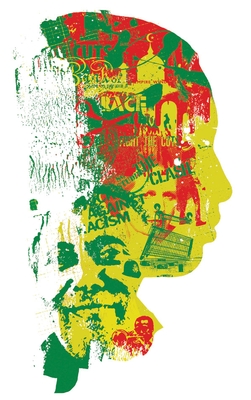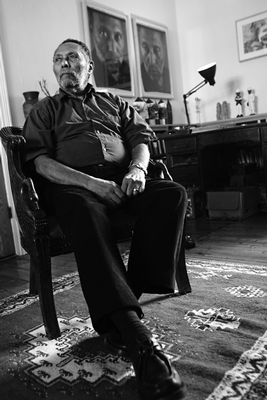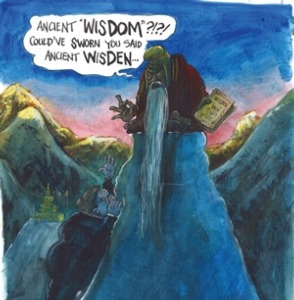
It was, I recalled, as I walked up the front path, five years almost to the day since I last went to Stuart’s home to interview him for New Humanist. On that occasion I remember having to call a halt to the conversation because of his evident tiredness, a tiredness brought on by the strain of his regular kidney dialysis sessions.
Since that time Stuart has received a replacement kidney and although there were some ensuing complications I quickly detected a new spring in his voice as he led me through to the back kitchen, brought coffee cups to the table and, with some evident reluctance, turned down the Miles Davis track which he’d clearly been relishing over breakfast.
One other thing that had stayed in my mind from that previous interview was the strange reaction it evoked from David Goodhart, then editor of Prospect magazine. On the Guardian’s comment blog, he bemoaned the lack of “facts” in the interview, branded my interviewing style as “sycophantic”, and suggested that Hall’s sweeping generalisations betrayed the legacy of the Enlightenment.
I’d been happy to put up my hands to the charge of “sycophancy” if this referred to my readiness to listen carefully and sympathetically to the thoughts and ideas of someone whose writing and lecturing over the last 50 years have come to inform every serious intellectual debate about the ideological role of the media, the phenomenon of neo-liberalism and Thatcherism, and the nature of culture and cultural identity.
But Goodhart’s desire for facts and his suspicion of generalisations seemed liked nothing more than a good old English empiricist resistance to anything that smacked of theory. It was a recipe for silencing thought that I felt only too pleased to ignore as I began the interview by asking Stuart about his reaction to David Cameron’s recent declaration about the failure of what he’d called “state multiculturalism”.
It was, Stuart suggested, a phrase which could only be understood by contrast with the idea of multi-cultural drift, the belief that immigrants could manage to remain true to themselves and to the traditions they wished to retain whilst also making the huge step of adapting to another country and another culture.
And that drift had certainly occurred. “Just think of the visibility of black people in the media, in sport, in popular culture. So there has been a drift but towards what exactly? Tolerance? Acceptance? Positive identification? But, you know, you still don’t have to go very far to find people who ask: Why are they here? Why don’t they go back where they came from? People have been asking me to go back where I came from since I arrived in 1951.”
And had that attitude become more common in recent years? Hall thought it had and suggested that one factor that had interrupted the increasingly benign view of visitors to Britain was the rise of Islamic fundamentalism. It was this phenomenon that had prompted the idea of actively intervening in the process of multiculturalism. “It is only now with the idea of the government funding Muslims so as to ensure that their own young people don’t become radicalised that we see a deeper kind of investment, an attempt to engineer what is happening inside those communities. I don’t think we’ve quite seen that before. We’ve seen the police managing them in their areas of settlement. But we haven’t seen this internal penetration.”
But there had also been shifts within the communities themselves. “Do you know that until relatively recently if you asked a Pakistani what their identity was, they would tell you the nation to which they belonged, not the religion. So the emergence of Islam as the glue of identity, whether good or bad, dangerous or peaceful, is a relatively new phenomenon.”
In Hall’s view this shift has come about as young Muslims have increasingly come to regard the manner in which they are treated in this country as reminiscent of their colonial past. “It’s a kind of re-identification by the younger generation. They’ve gone back to the religion of their parents with increased fervour. And, of course, at the same time Islamicisation in the Middle East has taken on a much more political shape.”
No one has written about the problems of immigrant identity with more sensitivity than Hall. He has been ceaselessly absorbed with questions of how people with different backgrounds, languages, religious beliefs who have to live together manage to make such a common life without retreating into warring tribes. He has always insisted that the great enemy of this multicultural endeavour is cultural absolutism. In his words the critical question is: “How much do we retain and how much do we give up of our cultural identity in order to be ourselves?”
Politicians who peddle exclusive definitions of “Britishness” simply don’t acknowledge this issue. Britishness needs to become more not less inclusive. The idea of multi-ethnic, mono-cultural society is a “contradiction in terms”.
I wondered if this view meant that he was wholly cynical about those who argued for some assertion of what might be called a British collective identity
“I wouldn’t say I’m cynical. I understand the drive behind that argument. But it’s a particularly complicated issue in an old imperial society which has had to give up managing so many other people in the rest of the globe and then find themselves saying, ‘Well, what’s left of us?’ So I’m not surprised that identity has become a political question. But I am in despair, almost ironic, about the actual forms that it takes. I mean, St George’s Day. Can you imagine! But at the same time it’s true that the globalisation thesis has greatly overplayed the decline of the nation state and national culture. Face to face with globalisation, the internationalisation of culture, of models, of literature, of musics, people still want to know, ‘Am I rooted anywhere?, Do I believe in anything?, Am I different from the people across the Channel?’ All that precipitates the search for somewhere to stand. Now the question is, how do you find that somewhere without going back to the way it used to be in imperial times? That’s the dangerous element.”
I tell Stuart that although I respect and understand the importance of feeling different, of being in some sense true to one’s own culture and history and not imposing that identity upon others with different life stories, wasn’t there a danger that this obsession with difference interfered with, or even contradicted, the notion of universal values, of transcendent human rights?
“You speak to someone who was a passionate universalist in his youth but who has been converted. I’m not converted to its opposite but to a deep scepticism about its speed, depth and prospects. I think difference has been grossly underestimated. Difference creates the possibility of drawing a line between those who own the resources and those who want to get at them. Now that doesn’t mean there aren’t overarching values but I wouldn’t rest my hopes on them. There’s always a drive to make values more universal. But I don’t think you ever get to the point where there is an overarching global morality. I don’t believe it. I think there will always be segmentation. I think it will always be beset by the impact of history and the legacy of longstanding differences. Think about religion. Think about the historical impact of religion. Many societies worship what they think is the same god, but the fact that they do so through a particular local, tribal or church congregation is very important. That local nature is what gives them a purchase on the world. It defines them against others. The outside defines the inside and the process of including the outside in the inside may never arrive.”
I knew enough about Stuart’s biography to recognise the deep personal reasons that lay behind his insistence on the power and intransigence of difference. When he was growing up at his home in Kingston, Jamaica, he was told by his mother that he should not bring black school friends home, even though to white eyes he was black himself. In a 2007 interview with Tim Adams in the Guardian he revealed how his own sister’s life was crushed by that mentality. She fell in love with a black medical student but was barred from seeing him by her mother. This precipitated a breakdown which was treated by electric shock treatment and she never enjoyed another relationship. “She stayed at home. She looked after my mother and my father, then my brother who was blind.” His sister’s life was, he now says, “one of the reasons I have never been able to write about or think about the individual separate from society. The individual is always living some larger narrative whether she likes it or not.”
I suggested to him that while it might always be necessary to acknowledge the obstinacy of difference, wasn’t there a danger that this recognition could provide an opening for the worst kind of cultural relativism, that it could lead to a condoning of abhorrent practices?
“Far from it. The only move I wouldn’t accept is that we object to the practice in terms of universal values. Instead of telling others that Western society has a claim on universal enlightenment values and these are what people should follow, you look at the points that really matter. Does it matter that some people like halal meat and others don’t? No, it doesn’t matter a damn. Does it matter that a Sikh is allowed to wear a turban as a bus conductor while others are not? No. It’s not going to bring civilization down. But when you ask if it is right for a state which aspires to some conditions of modernity to have a law which says that it’s okay to stone to death a woman who has committed adultery, the answer doesn’t point towards universal values. It points to a difficult, democratic, open debate. Assertions of universal values are so often ways of saying that we got there first. When we say that this is wrong according to my book, that book is often the imperial one. Of course, some things are unacceptable but your belief in this comes from your own values rather than from an inscribed universal set. That leads to debate, a debate in which we open ourselves up to people other than ourselves. It’s a democratic practice which recognises that it can’t embrace everything but it’s trying to enable people to live together, without eating one another and without pretending they’re the same. That’s what the multicultural project is about.”

But all that was to change with the arrival of Mrs Thatcher. It was Hall’s profound annoyance at the left’s failure to understand or appreciate the ideology that he was to call “Thatcherism” that impelled him into the heart of the national political debate. He now admits that until Thatcher took power he was relatively satisfied with the development of the welfare state and the view of the common good that this embodied. But all that changed.
“It was plain to me that Thatcher coming to power was the result of the disintegration of the welfare settlement. She saw the opportunity not just to take power but to move the direction. Milton Friedman, who is an arch explainer and apologist for monetarism and neo-liberalism, once said, ‘crises are critical’ because in crises you can not only introduce new things but you can pick up the elements of vision which were marginalised in the previous one. In this instance, you can go back to the market. We’ve been a market society since God knows when, but there’s a moment when it can be announced as a new vision, an idea whose time has come.”
Hall may have fervently disapproved of Thatcher and all her works but this in no way lessens the obvious admiration he still has for the way she used existing cultural resources to make her case.
“Mrs Thatcher was an incredibly skilled politician. She could precisely ventriloquise the popular voice.” He mimics her programme. “‘Look, I don’t know much about economics, but I do know that if you don’t have much money you buy only a few things at the grocery shop to put in your cabinet. You don’t go out and spend.’ Well, very few lecturers in economics have summed up the matter quite so succinctly. It’s not only a trick. It is knowing what are the deeper currents moving in society from which it is possible to put together a political change of direction which has been lying around. We are all in the market. We know it. We shop every day. We think it’s very important. We want the money to do so. Yet the idea that the market enables this rather than the welfare state or the nationalised industries is a seizure of a moment, an ideological moment. And that moment has not ended. Current neo-liberalism is that moment three variants on. Thatcherism, New Labour, the Coalition. Thatcherism blitzed the society. It was a Panzer tank. It was scorch and burn. It was the determination to rip it all up and try to start again. And rip it up she did. That was part of the reason why people who were transfigured by her convictions knew she had to go. At a certain point you can’t destroy any more. You have to build. But the paradox is that the people who built this new project into a system of governance was New Labour. Not the Conservatives. Blair waged war on the party to shift it to the centre right and Cameron waged a similar kind of muted war against the backwoodsmen and backwoods-ladies of the Conservative Party to move to compassionate conservatism.
“If you look at Labour policy, of course they did some good and progressive things. Minimum wage and so on. They were playing off both repertoires. But which was the dominant one? Enter spin. How do you make the left think the word you are using is same as the right thinks it is? Language is absolutely critical. Think of the nonsense about fairness which has gone on since the coalition came in. It’s used by every minister, every spokesman, on almost every occasion. Fair. You know what ‘fair’ means. We’ll tax the rich and the poor the same. Is that fairness? Yes. Except that it leaves the rich rich and the poor poor. It leaves the structure within which fairness is being exercised as a sort of given.”
It was a sort of a relief to hear Stuart sounding so politically assured. After my first interview with him appeared, I’d been told by some readers that they’d been a little saddened by his apparent pessimism about the future, by his belief that there was little alternative to a future dominated by the market, by individualism, entrepreneurialism and competitiveness. “I think things are stuck,” he’d said. “I am not so disillusioned as to think that history is finished. But I do think that what Gramsci would call the balance of social forces are very powerfully against hope.”
I wondered if Stuart had found some new hope in the recent developments in the Middle East, in the brave attempts being made by ordinary citizens to overthrow authoritarian regimes.
“I think I’m very wary, wary and weary, of the cynical response of the old left. ‘Oh well, the West is sending in the military, just waiting for the opportunity to secure the oilfields.’ History does not work like conspiracy. It’s not only to be judged in terms of what happens in the end. What happens on the way to the end always leaves a trace, always has an impact. Things are never exactly as they were. The Middle East has been the source of huge geopolitical instability for 30 years. If that region moves to even mild democratic reform and greater freedom of speech, just that alone will shift history.
“I hope the Americans and the British and Western Europe are asking, ‘How can we secure our interests in a world that has woken up to the fact that we made alliances with the most dreadful people in order to accomplish our own success and hegemony in the world?’
“There will be real consequences of any shift. Remember 1968 when everyone said that nothing changed, that nobody won state power. It’s true. The students didn’t win. But since then life has been profoundly transformed. It will never go back to what it was before that. Ideas of communitarianism, ideas of the collective, of feminism, of being gay, were all transformed by the impact of a revolution that did not succeed. If you look back to the 19th century you’ll find 1848 was exactly the same. So I don’t believe in judging the historical significance of events in terms of our usually faulty judgement of where they may end up.”
I suppose I might have chosen that moment to suggest to Stuart that he was engaging in generalisations and possibly thereby betraying the legacy of the Enlightenment. But I settled for a polite thank-you and a friendly handshake. “I’ll let you get back to that great Miles Davis,” I said as I pulled on my coat. Only when I was halfway home did it occur to me that if I’d have been in a less sycophantic mode I might have told him that give or take an album or two I rather preferred Clifford Brown.
This interview is based on a recording for Laurie Taylor’s Radio 4 programme Thinking Allowed. An edited version of that interview was broadcast on 16 March and can be heard by using R4’s online ‘listen again’ facility.

